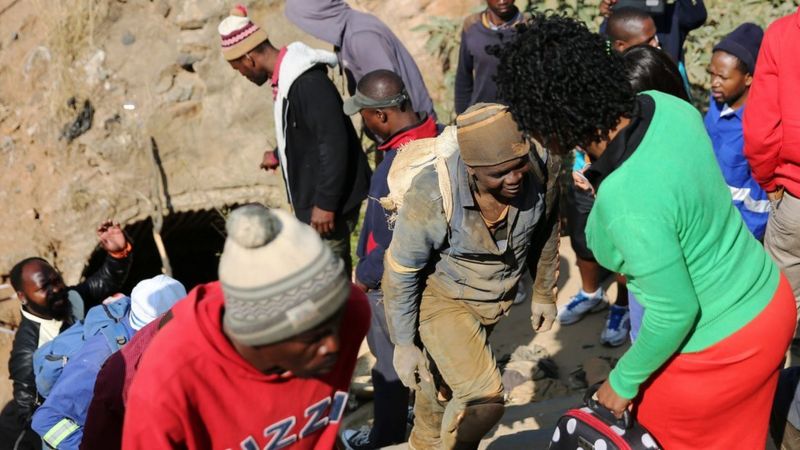Chris Mokolatsie
Thousands of illegal miners —known as zamazamas— many believed to be from Lesotho, are facing risk of death by starvation, as law enforcement authorities adopted cruel ill-conceived measures in a desperate attempt to curb illegal mining in what they call “surrender or starve” strategy dubbed operation Operation Vala Umgodi. As many as about 4000 people are believed to be trapped in the dark, treacherous tunnels of abandoned mine near the North West town of Stilfontein as police block their food and water. Drawn by desperation, and unemployment, these miners risk their lives in decommissioned mines left unsecured by large mining companies for scraps of minuscule gold deposits.
The crackdown on these miners by police while doing nothing to crack down and arrest the real criminals behind the demand for illegally mined gold and gold smugglers buying and selling illegal gold smacks of collusion with smugglers and criminals. This attack on vulnerable people by police has nothing to do with fighting the criminality of illegal mining but is a performative public relations and gesture politics diverting the attention of the public from the real criminals and the failure of the state to regulate mining companies properly.
Equally uncaring are the governments such as that of Lesotho from where these miners come especially who appear not to care to find lasting solutions to the conditions that compel these people to take these desperate and risky to eke out a living in unsafe and abandoned mines in the first place.
Mining Corporations and the Failure of Mine Decommissioning
Illegal mining or zamazamas has been a pervasive issue in South Africa for many years now. These miners, have of late become soft targets of a brutal crackdown by the police, including the barbaric measures law enforcement has adopted of using starvation as a “crime prevention” tactic, a practice that is not only inhumane but verges on a war crime. If this is not the proverbial “ho tśaba lehala le ho mathela moratheng” I don’t know what is. The real criminals and culprits in this whole saga are firstly the the large mining corporations that have abandoned their mines without clear decommissioning plans, and yet they remain relatively unscathed, shielded from responsibility.
Mining corporations in South Africa have long contributed to the economic landscape, but with their operations come significant responsibilities. The environmental impact of mining requires strict adherence to decommissioning regulations to ensure that once a mine has ceased operations, it does not become a hazard to local communities or a tempting ground for illegal activities. However, these decommissioning responsibilities are often ignored or inadequately enforced, and here the South African government is to blame. Mines are abandoned without proper rehabilitation, leaving behind derelict structures, and vast networks of tunnels that become havens for desperate artisanal miners.
Instead of holding these companies accountable for failing to adhere to proper decommissioning requirements, the government has shifted its punitive focus onto the vulnerable zamazamas. This misplaced punishment exacerbates the issue by targeting the symptom rather than the root cause. Mining companies should be legally obligated to close down and secure decommissioned sites responsibly. Failure to do so leaves open access to these sites, which many impoverished people turn to as a last resort for survival.
The Misguided Police Response and the Human Rights Violations
South African police’s failure to use intelligence policing to crack on illegal mining has led them to ill-conceived stunt actions against illegal miners including draconian measures including the most disturbing tactic of using starvation to “fight crime.” By cutting off food supplies and using starvation as a deterrent, law enforcement disregards basic human rights and endangers lives. Under international law, starving civilians as a tactic is illegal and constitutes a potential war crime. Readers will recall that the South African government has itself prosecuted successfully the case against Israel at the International Court of Justice (ICJ), and one of the key pillars of its argument was the use of starvation of Palestinians by Israel as a violation of the Genocide Convention in respect of Israel’s actions taken in Gaza. And yet here it is condoning a similar action against Zamas zamas by its own police force, although not to the same scale as what is happening in Gaza. Such measures are not only unconscionable but ineffective. These are morally wrong because they criminalise poverty and vulnerability while protecting capital and wealth and avoid addressing systemic failures as a result of the relationship of government and capital, and how since 1994 the government has turned a blind eye to the mining companies for fear to scare capital.
South Africa prides itself as a society that aspires to uphold human rights, yet in recent weeks, it has condoned using hunger as a policing tool. This is both barbaric and a stain on South Africa’s democratic principles. The South African Human Rights Commission should urgently investigate any possible wrongdoing should any of the thousands of trapped miners die as a result of this cruel policing strategy. This kind of cruelty cannot be tolerated in any civilised society committed to justice, fairness, and respect for human dignity, which South Africa prides itself on globally.
The Elephant in the Room – Overlooked Gold Smuggling Network
Adding to the injustice and immoral nature of this recent police action is the fact that law enforcement appears to have no interest whatsoever in the gold smugglers at the center of illegal mining and driving this trade. They have simply it would appear turned a blind eye to the powerful criminal networks that benefit from illicit trade. These networks buy illegally mined gold from Zamazamas and profit massively, operating without fear of repercussion. By choosing to arrest artisanal miners rather than dismantle the smuggling operations, authorities avoid confronting the larger and more powerful actors who truly perpetuate illegal mining. This failure reflects a lack of willpower, strategic oversight, or possibly even corruption and or collusion within policing ranks, as the economic and political influence of gold smugglers often enables them to evade justice.
A Call for a Sustainable and Legal Solution to Artisanal Mining
The solution to illegal mining is neither to starve people to death, which is a crime itself, nor to criminalise small-scale vulnerable people who seek only to survive. Instead, the government should implement clear provisions within mining regulations that would allow for the legalisation and regulation of artisanal mining. One potential approach is to repurpose decommissioned mines as community-regulated artisanal mining zones. By granting communities legal access to these resources, regulated and overseen by local authorities, individuals can engage in safe, lawful, and sustainable mining practices. This approach would help lift impoverished communities out of poverty, mitigate the risks associated with abandoned mines, and shift economic benefits from illegal networks to local populations. Government-backed initiatives could further assist these communities by providing training and equipment to ensure safe practices, while environmental standards would protect against degradation.
In the short term, mining companies must be held accountable for every mine they decommission, with strict oversight to ensure compliance with environmental and safety regulations. Police forces need to be reformed, and their tactics scrutinised to prevent future human rights abuses. The South African Human Rights Commission must launch an independent investigation into the use of starvation as a policing tool and ensure that the ICJ is involved if necessary.
The true criminality lies in the systemic neglect and exploitation by mining companies, unregulated abandonment of mines, and heavy-handed policing practices that treat poverty as a crime. To foster a more just, prosperous, and lawful mining sector, South Africa must recognise the potential of artisanal mining, regulate it responsibly, and defend the rights of vulnerable citizens instead of punishing them for surviving.
Lessons for Lesotho Mining Sector
For countries like Lesotho, whose mining sector is still in its infancy, this plight of illegal miners in South Africa offers crucial lessons in sustainable and responsible mining practices. The South African experience underscores the importance of stringent regulations on mine closures, thorough decommissioning processes, and responsible corporate accountability from the outset. As Lesotho develops its mining industry, it has the opportunity to establish policies that prioritise long-term community welfare, environmental protection, and economic inclusivity. By implementing clear regulations on decommissioning, creating transparent community engagement programs, and considering frameworks for legal, small-scale artisanal mining, Lesotho can avoid the pitfalls South Africa faces today. Learning from these challenges, Lesotho has a unique chance to build a mining sector that not only generates wealth but also protects local communities and prevents the emergence of illegal mining networks that thrive in abandoned, unregulated spaces.
Ends… (@ntatechris.bsky.social)
Summary
- This attack on vulnerable people by police has nothing to do with fighting the criminality of illegal mining but is a performative public relations and gesture politics diverting the attention of the public from the real criminals and the failure of the state to regulate mining companies properly.
- Equally uncaring are the governments such as that of Lesotho from where these miners come especially who appear not to care to find lasting solutions to the conditions that compel these people to take these desperate and risky to eke out a living in unsafe and abandoned mines in the first place.
- Readers will recall that the South African government has itself prosecuted successfully the case against Israel at the International Court of Justice (ICJ), and one of the key pillars of its argument was the use of starvation of Palestinians by Israel as a violation of the Genocide Convention in respect of Israel’s actions taken in Gaza.

Your Trusted Source for News and Insights in Lesotho!
At Newsday Media, we are passionate about delivering accurate, timely, and engaging news and multimedia content to our diverse audience. Founded with the vision of revolutionizing the media landscape in Lesotho, we have grown into a leading hybrid media company that blends traditional journalism with innovative digital platforms.










